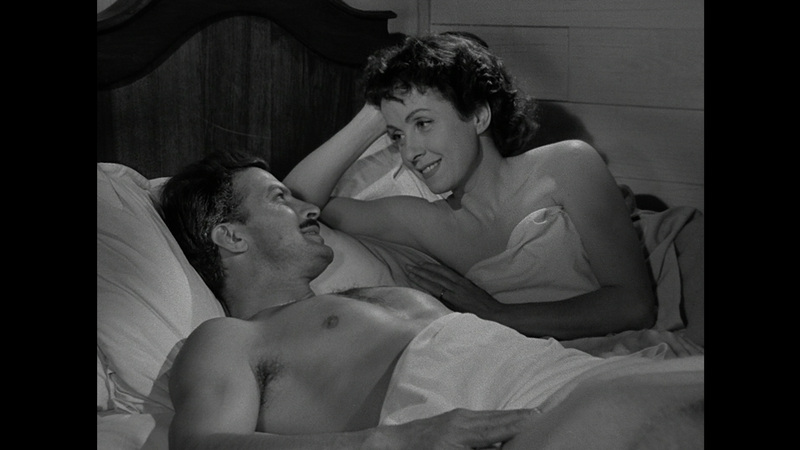
The Rules of Society Versus the Rules of Nature
MOVIE REVIEW
Lady Chatterley's Lover (L'amant de Lady Chatterley)
–
Genre: Romance, Drama
Year Released: 1955, Icarus Films Blu-ray 2025
Runtime: 1h 44m
Director(s): Marc Allégret
Writer(s): Marc Allégret, Gaston Bonheur, Philippe de Rothschild
Cast: Danielle Darrieux, Leo Genn, Erno Crisa, Janine Crispin, Christian Marquand
Where to Watch: available October 25, 2025, pre-order your copy here: www.vinegarsyndrome.com
RAVING REVIEW: LADY CHATTERLEY’S LOVER arrives with a reputation larger than its running time. As the first (of many) feature adaptations of D.H. Lawrence’s legendary novel, this 1955 version wears its history in every frame: a French production translating a very English scandal, built in the language of a studio romance rather than raw transgression. Seen today, it fascinates less as provocation and more as a window into mid-century decorum, the careful ways filmmakers worked around censors, and how a love story about class and the body could be shaped into something both daring for its moment and undeniably acceptable.
Marc Allégret directs with a meticulous eye, staging encounters as carefully composed representations. The black-and-white photography favors glowing faces and sculpted interiors; even the woodland passages feel curated, more garden than wilderness. That aesthetic polish is part of the film’s spell. It invites you to lean in, to search the space between words, to notice how a lingering look or a gesture can carry more charge than an explicit embrace. Allégret’s strength has always been a certain elegance—an assurance in how to frame performers and let light do the whispering—and it’s present throughout.
Danielle Darrieux embodies Constance with control. She makes the character’s private world legible without screaming it: a pause before a doorway, a breath that’s just a measure longer than allowed, a softness that interrupts the rigor of routine. This Constance isn’t a tempest; she’s a pressure cooker, building and building until the air in the room changes. Opposite her, Leo Genn’s Clifford is played with chilly dignity, the confidence of a man whose world is built on rules he believes are unbreakable. Erno Crisa’s Mellors—the person who upends that world—adds warmth and balance, less a fantasy figure than a reminder that the living body has claims!
What the film does exceptionally well is articulate the social architecture that cages desire. The rooms are too orderly, the conversations too polished, the rituals too rehearsed; the world hums along while something essential vanishes. Constance’s restlessness isn’t presented as rebellion for its own sake; it’s the recognition that a life constrained by injury, class, and performance can’t be repaired by sheer will or better manners. The love affair becomes a test of competing loyalties—marriage as contract versus marriage as sanctuary; status versus self; a mind pledged to duty versus a body that refuses to be ignored.
The performances anchor the film. Darrieux crafts an interior portrait of awakening that resists easy labels—a noblewoman who isn’t cold so much as encased, a wife who loves her husband and cannot pretend that love has solved the irreconcilable. Genn is carefully unsentimental, letting Clifford’s entitlement and genuine pain coexist without pleading for absolution. Crisa, meanwhile, grounds Mellors not in fantasy but in calm insistence: here is a man who knows the weather of the body and refuses to call that knowledge vulgar.
As a piece of film history, this work matters. Its release history, initial bans, and later legal vindication trace a line through mid-century debates about obscenity, art, and who gets to decide what people may watch. You can feel the film negotiating those boundaries with craft—holding on a face a moment longer, ending a scene before the appetite becomes explicit, using composition to keep desire present while staying within the law. It’s cinema as a series of elegant end-runs around the limits of its day.
The restoration brings back the shine—silvers and shadows regain their pronunciation, and the lighting that flatters faces also deepens the sense of confinement in the interiors. The sound mix favors dialogue and score over ambience, in keeping with the era’s studio standards. The pacing reflects confidence: measured but never inert, always moving toward moments where politeness snaps.
What lingers isn’t shock but the clarity of its design: how a society polices bodies; how a marriage survives on terms that honor no one; how a woman learns that desire isn’t disloyalty, it’s truth. The film respects that truth even when it blinks at its brightness. As cinema history, essential; as a romance, quietly affecting; as an interpretation of Lawrence, refined and partial by design. The result earns its place as a landmark—one to be appreciated for its craft, its performances, and the door it helped nudge open—even if later versions would walk through that doorway with far bolder steps.
Please visit https://linktr.ee/overlyhonestr for more reviews.
You can follow me on Letterboxd, Instagram, Twitter, and YouTube. My social media accounts can also be found on most platforms by searching for 'Overly Honest Reviews'.
I’m always happy to hear from my readers; please don't hesitate to say hello or send me any questions about movies.
[photo courtesy of ICARUS FILMS]
DISCLAIMER:
At Overly Honest Movie Reviews, we value honesty and transparency. Occasionally, we receive complimentary items for review, including DVDs, Blu-rays, CDs, Vinyl Records, Books, and more. We assure you that these arrangements do not influence our reviews, as we are committed to providing unbiased and sincere evaluations. We aim to help you make informed entertainment choices regardless of our relationship with distributors or producers.
Amazon Affiliate Links:
Additionally, this site contains Amazon affiliate links. If you purchase through these links, we may receive a commission. This affiliate arrangement does not affect our commitment to honest reviews and helps support our site. We appreciate your trust and support in navigating these links.



Average Rating